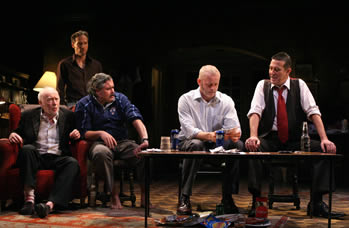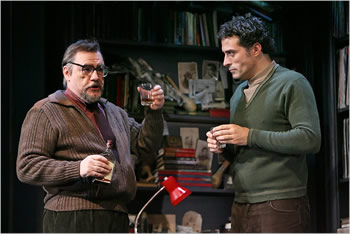HotReview.org Editor's
Picks
Shows Worth Seeing:

The Seafarer
By Conor McPherson
Booth Theater
222 W. 45th St.
Box office: (212) 239-6200
Conor McPherson is the playwriting
counterpart to the garrulous uncle who never shuts up at family
gatherings, but for reasons you don’t quite understand you
can’t stop listening to him. He’s a bewitching yarn-spinner
with deep affection for the people he describes and skewers, and
a writer with that gift makes you forget about a lot of matters
that would otherwise bother you: like flimsy allegory and overused
circumstances. Who would have thought there was more dramatic
juice to be squeezed out of a bunch of pathetic Irish good-for-nothings
sitting around getting soused? Well, there is, and it’s
not because of the unconvincing Faust parable McPherson splices
into the action. One Christmas eve, four alcoholics gather at
a suburban home north of Dublin to play cards and drown their
self-loathing, and they’re joined by a stranger who turns
out to be the devil, who threatens one of their souls but then
loses in an eleventh-hour reversal. None of that really matters,
though. The plot, such as it is, is just a scaffold for some of
the strongest and most acutely observed acting seen on New York
stages this year. Jim Norton, who was also wonderful in McPherson’s
The Weir, is unforgettable as blind Richard, who mercilessly
manipulates his brother Jim (David Morse) but who also hides life-saving
compassion behind his bluster and trickery. Conleth Hill’s
portrayal of Ivan is also first-rate, and terrifically odd, played
as a sort of affable leech who sucks his fill while waiting to
be burned with a cigarette. The major achievement in this production
is the collection of stunningly accurate alcoholic portraits,
which collectively tell their own moving tale of avoidance, denial,
incapacitating self-contempt, and implausible redemption.
-------------------------------

Rock 'n' Roll
By Tom Stoppard
Bernard B. Jacobs Theatre
242 W. 45th St.
Box office: (212) 239-6200
On the face of things, Rock ‘n’ Roll could
be easily taken for the usual overstuffed Stoppard mélange
that tries to wow us with a collision of multiple complicated
subjects and ends up dealing with none satisfactorily. There are
at least three different plays colliding here: one about secret
police excesses and government paranoia in Czechoslovakia after
the violent end of the Prague spring; one about a die-hard Communist
Cambridge professor pressured to clarify his relationship to Eros;
and one about the former Pink Floyd member Syd Barrett, who went
into seclusion after a mental breakdown in the late 1960s. Impressively,
all of this actually comes together into an emotionally coherent
and satisfying whole, partly because one of the stories is clearly
personal for Stoppard and partly because of the uses the play
makes of rock music. The character Jan (played with unforgettable
precision and subtle suggestion by Rufus Sewell) is a brilliant
Czech graduate student at Cambridge who decides to return to Prague
in 1968 rather than leave like many other intellectuals. His story
of having political activism gradually thrust upon him by the
actions of brutal authorities is the Czech-born Stoppard’s
imaginative speculation on how his life might have gone had he
chosen to return to his birthplace as an adult. There are blatant
nods to several of Stoppard’s intellectual heroes of the
time, especially Vaclav Havel and Pavel Kohout. But the force
that ultimately binds all the play’s strands (and achieves
deep connections with the audience) is the rock music that Jan
loves, which plays loudly and extensively between scenes, is instrumental
in transforming him, and ultimately links up with the professorial
speculations on Eros. Brian Cox is just the right sort of pontificating
powerhouse for the role of Max, the professor. Sinead Cusack,
Alice Eve and Nicole Ansari are excellent as the women in his
life, who pull him away from his neat mechanistic model of the
human psyche. And the director Trevor Nunn does such a fine job
of elegantly keeping all these various balls in the air that he
should get some sort of award for juggling.
----------------------------------

Mauritius
By Theresa Rebeck
Biltmore Theater
261 W. 47th St.
Box office: (212) 239-6200
The first wave of reviews of Mauritius—Theresa
Rebeck’s first play on Broadway—have hammered it for
its likeness to David Mamet’s American Buffalo.
There are indeed blatant similarities, including the use of choppy,
Mametesque language, and Rebeck would have been wise to offer
some pre-opening remarks explaining her feelings (homage? antipathy?
competitiveness?). Nevertheless, I strongly urge HotReview.org
readers to see the play and judge it for themselves. In American
Buffalo, a scheme to steal a possibly valuable coin dramatizes
the way commerce confuses and poisons friendship and loyalty among
a trio of thuggish dimwits. In Mauritius, a messy struggle
between two intelligent half-sisters over what to do with a possibly
valuable, inherited stamp collection sets in motion a nuanced
story about the effects of greed, abandonment, betrayal and opportunism
on people with fatefully different self-images. I happen to be
a Mamet fan, but I’ve always hated American Buffalo,
which presents an unremittingly loathsome picture of thoroughly
loathsome people. It’s emotionally monotonous, with a tedious
and frustrating plot built entirely around entrapment, extortion
and posturing among supposed friends. Rebeck, for her part, never
dwells on the loathsome for its own sake. Her tale of scheming
and petty crime indulges in muck but also illuminates because
her characters are articulate enough to probe questions of authenticity
that Mamet merely skimmed. The struggle over the stamps is in
part a class conflict, since the sisters were brought up in different
circumstances and since Philip, the snobbish expert who must be
relied on to authenticate the stamps—played with dead-on
weaseliness by Dylan Baker—tosses off earnest speeches about
heritage and moral rectitude the way the others fire off profanities.
Before you judge Jackie, the younger sister (played by the wonderfully
pouty Alison Pill), too harshly for not contacting a lawyer, remember
Philip’s sliminess, and consider how little anyone in Jackie’s
position would expect from any professional. The first-rate cast
also includes F. Murray Abraham, Bobby Cannavale and Katie Finneran,
and the direction by Doug Hughes is cogent, swift and focused.
